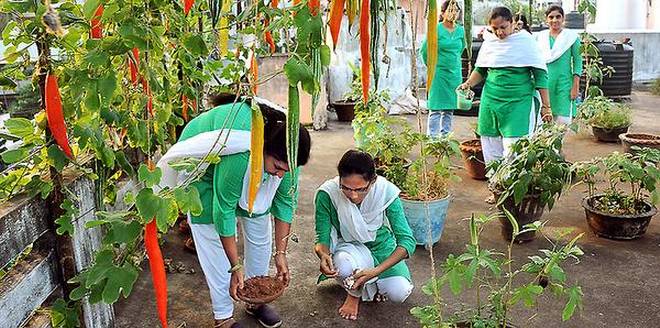Showing the way for a ‘green’ lifestyle
Kitchen gardening and waste management are the hot topics in the city these days. With many ways to compost and manage a kitchen garden, the possibilities are endless. But where do you begin? How do you develop a thriving vegetable garden and turn the wet waste from kitchen into nutrient-packed soil? It is to provide a solution and encourage people to adopt the practice of zero-waste gardening technique, city based organisation Paryavarana Margadarsi Vaisakhi (PMV) has embarked on a mission to create a ‘green’ lifestyle in the city by reaching out to the residents of the city with workshops and extending technical support for growing vegetables at homes.
The terrace of the organisation’s office at Chinna Waltair is brimming with more than 40 varieties of vegetable and medicinal plants. Here, 15 pairs of hands work passionately on growing the vegetables, attending to pest issues and creating natural fertilisers and manure. These are the core members of PMV, who are involved in making a model kitchen garden from the past one year. Today, the organisation has 3,800 members who have benefited from the kitchen garden workshops organised by PMV and replicating a similar ‘green’ zone at their homes.
“Our idea is to create awareness among people to grow native vegetable plants and stay away from the non-native, hybrid varieties that are abundant in the market. We get all the native plant seed from interior villages of Eastern Ghats. Last year, we collected 310 varieties of native seeds,” says J.V. Ratnam of PMV. Supported by S. Vijay Kumar, the organisation has joined hands with GVMC and other organisations like Dhan Foundation, World Vision and Visakha Mahila Seva Sangham in its endeavour to create a culture of zero-waste kitchen gardens in the city.
Natural ways
“One of the ways to ensure a natural balance is by growing four to six varieties of plant seeds in a single pot planter,” says J. Rajeswari, secretary of PMV.
At the organisation’s kitchen garden, there are curry leaves, brinjal, chilli and guava – all grown in one flat wider pot planter.
Source:-thehindu.c




